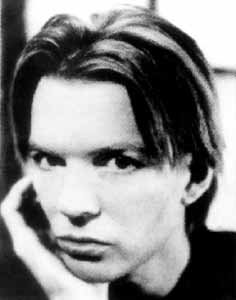|
Support CatholicBoy.com! |
Carroll's clean diariesAs the poet laureate who inspired punk rock's first generation in the late '70s, Jim
Carroll brought mysticism and beauty to New York City's seamy underbelly.  The book, written in the mid-'60s, published in its entirety in 1978, and made into a 1995 film starring Leonardo DiCaprio -- tells bizarre tales of Carroll's teenage days as a star athlete, scholar, and heroin addict in the working class, Irish-Catholic Upper East Side of Manhattan. With heroin enjoying a renaissance in '90s pop culture, The Basketball Diaries is often dragged out as a root of heroin chic, much to the author's chagrin. It is also seen as an anti-drug book. "They don't even try to reach me for comment," says Carroll. "I've met kids getting over drug problems who think of it as a real anti-drug book. It's just where you are in your life and what you want to romanticize." Carroll, who cleaned up in the mid-'70s, can recall doing interviews about the "new heroin chic" as far back as 1979. "It's really ubiquitous and cyclical," he says. "Other drugs like coke and stuff will come and go because they're uppers, and they're kind of elusive. Heroin puts you in this real solid place until it turns on you. Truthfully, I don't think about what someone's motives are for doing it. When I was a kid I'm sure I had certain romantic notions about it too. But, just because of my metabolism, it always allowed me to get work done. It slowed down the landscape -- I could see a lot of bullshit for what it was. "Then you reach a point where it allows you free passage not to do anything at all. You can justify, artistically, not even having to write: 'Oh well, I thought about it, that's good enough.' "What's scary about the stuff now is, as this one old timer I know was telling me, the stuff's like 80% pure. When I was doing it, it was, like, 18% pure." By rights, Carroll should be good and tired of talking about heroin. During our interview, he patiently entertains each question with deep thought and slow, sincere answers that shake and crackle out in his Manhattan accent. He often doesn't finish sentences, but never loses his train of thought. True to sage form, Carroll can't help but elaborate when it comes to rock 'n' roll -- he doesn't listen to many new bands but knows a lot about the evolution of rock lyrics -- and writing. He says he stumbled across a wealth of poems in his head while using a computer for the first time for his next two books. "I realized they were amazingly good for writing poems," Carroll says. "My poems used to be more spaced out, and in a technical sense the computer let me do things that I used to do. "I was always kinda down on computers, but this guy who wanted me to write a film script for Fox suggested I use one. I said, 'I don't buy that computer stuff.' He said, 'You don't have to buy it, we'll give you one.' I said, 'All right.' " Carroll is keeping the content of his novels under wraps, though he describes one as a "a money book, a movie book," and the second as "more fragmented and far-out. "You gotta keep it diamond hard. If you start chipping away at it by telling the story to other people it kinda depreciates it," he says. © 1997 Toronto Sun The original article was found here.
|
Site Map | Contact Info | About this site | About the webmaster
The Jim Carroll Website © 1996-2025 Cassie Carter